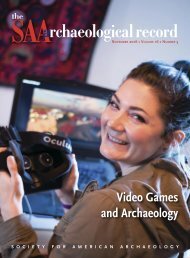TEACHING ARCHAEOLOGY IN THE 21ST CENTURYBurke, Heather, and Claire Smith (editors)2007 Archaeology to Delight and Instruct: Active Learning in theUniversity Classroom. Left Coast Press, Walnut Creek, California.Evenson R.1999 Soft Skills, Hard Sell. Techniques: Making Education &Career Connections. 73(4):29–31.Harding, Anthony2007 Communication in Archaeology. European Journal ofArchaeology 10(2):119–133.Hill, Sandra, and Paula Griswold2013 Potential for Collaborative Writing in Professional Communicationand Health Studies through Service-Learning.Business Communication Quarterly 76(1):54–71.Kansa, Eric C., Sarah Whitcher Kansa, and Lynn Goldstein2013 On Ethics, Sustainability, and Open Access in Archaeology.SAA Archaeological Record 13(4):15–22.Klaus, P.2010 Communication Breakdown. California Job Journal 28:1–9.Kuh, George D.2008 High-Impact Educational Practices: What They Are, WhoHas Access to Them, and Why They Matter. Association ofAmerican Colleges and Universities, Washington, D.C.Lawrence, Holly2013 Personal, Reflective Writing: A Pedagogical Strategy forTeaching Business Students to Write. Business CommunicationQuarterly 76(2):192–206.Mascle, Deanna DeBrine2013 Writing Self-Efficacy and Written Communication Skills.Business Communication Quarterly 76(2):216–225.Robles, Marcel M.2012 Executive Perceptions of the Top 10 Soft Skills Needed inToday’s Workplace. Business Communication Quarterly75(4):453–465.Sigmar, Lucia Stretcher, Geraldine E. Hynes, and Kathy L. Hill2012 Strategies for Teaching Social and Emotional Intelligencein Business Communication. Business CommunicationQuarterly 75(3):301–317.Smart, Karl L., Nancy Hicks, and James Melton2013 Using Problem-Based Scenarios to Teach Writing. BusinessCommunication Quarterly 76(1):72–81.Smart, Karl L., Christine Witt, and James P. Scott2012 Toward Learner-Centered Teaching: An InductiveApproach. Business Communication Quarterly 75(4):392–403.Stage, Frances K., Patricia A. Muller, Jillian Kinzie, and Ada Simmons1998 Creating Learner Centered Classrooms. What Does LearningTheory Have to Say? ASHE-ERIC Higher Education ReportVol. 26, No. 4. ERIC Clearinghouse on Higher Educationand the Association for the Study of Higher Education,Washington, D.C.Tuten, Holly, and Lesly Temesvari2013 Popular Science Journalism: Facilitating Learning throughPeer Review and Communication of Science News. Journalof College Science Teaching 42(4):46–49.Notes1Emotional intelligence has also been referred to as socialintelligence and a person’s emotional quotient (Sigmar et al.2012:302). Emotional intelligence involves interpersonal skills,including communication, that allow people to work effectivelywith others.2An example of constructivist learning is the Flipped Classroom,where students watch or listen to lectures at home and thenengage in collaborative learning in class by working through homework-styleproblems together, with the instructor’s assistance andguidance (for example, see Bergmann and Sams 2012).3Interestingly, HIP have especially positive learning outcomesfor underserved students, including first-generation students,minority students, and low-income students; in these cases, HIPhave proved to be transformational for student learning outcomes(Brownell and Swaner 2009:26).4Blum et al. (2013) found that communication apprehensionwas negatively associated with students’ willingness to take onleadership opportunities, multicultural appreciation, and adaptabilityto new situations. Surprisingly, no significant relationship wasfound between GPA and communication apprehension.5Reviews of engagement and learning outcomes in HIP settingsshow strong evidence for improved graduation and retentionrates and enhanced academic performance (Brownell and Swaner2009; Hill and Griswold 2013).26 The SAA Archaeological Record • May 2014
TEACHING ARCHAEOLOGY IN THE 21ST CENTURYTEACHING BASIC ARCHAEOLOGICAL SKILLSCURRENT APPROACHES IN UNDERGRADUATE FIELDAND CLASSROOM SETTINGSHeather A. Wholey and Carole L. NashHeather A. Wholey is Associate Professor in the Department of Anthropology and Sociology at West Chester University.Carole L. Nash is Assistant Professor in the Department of Integrated Sciences and Technology at James Madison University.“In my opinion, our major responsibility to the rest ofthe world is to do good, basic archaeological research.”—The Old Timer in The Golden Marshalltown: A Parablefor the Archaeology of the 1980s (Flannery 1983)Three decades ago, Kent Flannery’s (1983) metaphorical OldTimer insisted that basic archaeological research is bothfoundational to and expected in the discipline. Today, thatassertion can be made even more strongly, as archaeologistsare increasingly held accountable by local communities,descendant groups, clients, civic and municipal agencies,and students. It is thus well worth considering the relevantskills needed to conduct sound archaeological research andinterpretation and to examine the pedagogies involved intransmitting those skills. Teaching basic archaeological skillsto undergraduate students is a central concern within thearchaeological community of academic faculty, staffresearchers, students, and cultural resources professionals(Davis et al. 1999). Here we focus on the present state of thecurriculum for transmission of basic skills to undergraduatestudents who may continue to the professional world of culturalresources management or enter a graduate program tofurther their studies in the discipline. We also address thetransmission of basic skills to undergraduate students who,more commonly, will not pursue a career in archaeology butmay nonetheless garner important life skills. In many cases,these students will undergo transformative experiences thatwill leave them with an appreciation for the practice ofarchaeology and instill in them the value of stewardship forthe archaeological record and cultural heritage.BackgroundIn 1998 a small group of archaeologists gathered in WakullaSprings, Florida, to discuss the skills and ethical principlesneeded to address changes in archaeological practice, particularlydue to the growth of cultural resources managementand public archaeology, as well as technological innovations.One of the topics was curricular reform in higher education.Seven “Principles for a New Archaeology Curriculum”(designed to align with the SAA Principles of ArchaeologicalEthics) emerged, with specific recommendations for how, atwhat stage, and to what level each curricular principle shouldbe introduced into archaeology higher education. At thetime, it was proposed that students planning a career inarchaeology should demonstrate “the ability to make pertinentobservations of the archaeological record, describe andrecord these observations, and draw appropriate inferences”(Davis et al. 1999). To this end, students should work towardmastery of fundamental archaeological skills including “surveyand cartography (e.g., map making and reading), stratigraphy(e.g., draw and accurately interpret a soil profile),archaeological methods (e.g., complete field and laboratoryforms), database management (e.g., create and use datatables), and technical writing (e.g., write artifact, feature, andsite descriptions)” (Davis et al. 1998). The committee proposedthat, at the undergraduate level, specific topics, suchas observation/inferential skills, basic map skills (scales,contours), ability to organize and assess data, knowledge ofthe law, and description (one step above field description)would be appropriate to incorporate into standard undergraduatecourses (Davis et al. 1999). Table 1, originally publishedin Davis et al. (1999) and Bender (2000), illustrates theproposed sequencing and student target audiences in teachingarchaeological skills that emerged from the WakullaSprings conference.The SAA publication Teaching Archaeology in the Twenty-FirstCentury (Bender and Smith 2000) assembled the discussiontopics from the 1998 conference, with a few chapters focusingon or drawing attention to the undergraduate archaeolo-May 2014 • The SAA Archaeological Record27




